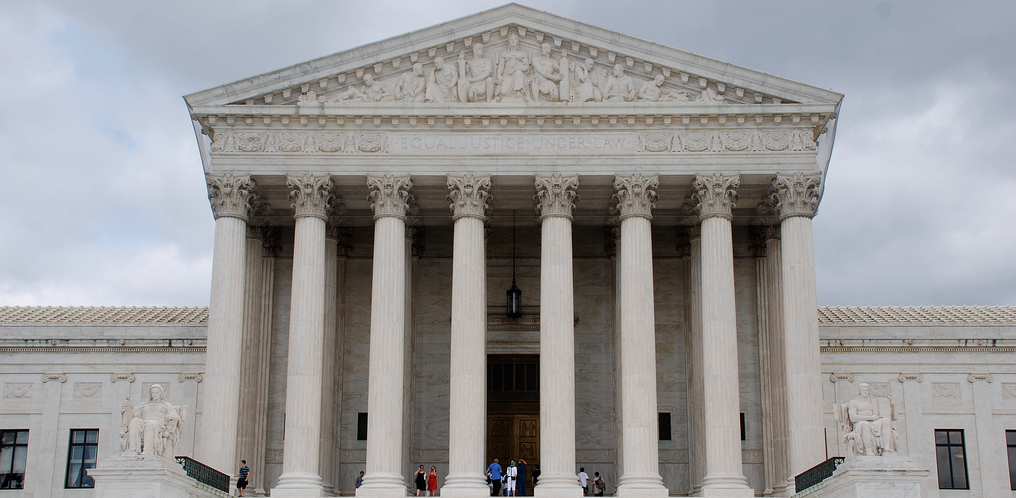Supreme Court Sides With TV Networks, Rules Against Aereo

(afagen)
Here is the PDF of the court’s opinion.
The majority of the court agreed with CBS, FOX, ABC, and NBC that Aereo — which takes freely available over-the-air signals and transmits them over the Internet to paying users is indeed publicly performing the networks’ copyrighted content.
“[B]ehind-the-scenes technological differences do not distinguish Aereo’s system from cable systems, which do perform publicly,” reads the majority opinion.
The ruling remands the broadcasters’ lawsuits back to the lower courts, but the decision by the Supremes means the company can no longer successfully argue that the service they provide is no different than putting an antenna on the roof of your building.
The majority felt that Aereo provides a service that is too similar to what cable TV providers offer for it to be treated differently.
“In other cases involving different kinds of service or technology providers, a user’s involvement in the operation of the provider’s equipment and selection of the content transmitted may well bear on whether the provider performs within the meaning of the Act,” reads the opinion. “But the many similarities between Aereo and cable companies… convince us that this difference is not critical here.”
Justices Breyer, Roberts, Kennedy, Ginsburg, Sotomayor and Kagan were in the majority on this opinion, while Justices Scalia, Thomas and Alito dissented.
Writing for the dissenters, Scalia states that the broadcasters failed to prove that Aereo does any public performing of the copyrighted content.
“The Court manages to reach the opposite conclusion only by disregarding widely accepted rules for service-provider liability and adopting in their place an improvised standard (“looks-like-cable-TV”) that will sow confusion for years to come,” writes Scalia.
We’ve reached out to Aereo for comment and will update if we hear anything in response. In previous interviews, the company’s founder Chet Kanojia had stated that there was no “Plan B” if Aereo failed to convince SCOTUS of its legality.
“If we optimize for loss or a potential loss, we give up optimizing for a win,” he explained at the time. “If you believe your position, the only thing you should do is play to win. We’ve never been dishonest with our investors. Everybody knows what the risks are.”
The bigger picture question involves what the SCOTUS ruling means for the future of cloud-based storage. The broadcasters had argued that Aereo’s cloud-based DVR system violated their copyright. This ruling could have far-reaching implications for other cloud-based DVRs, along with cloud-based storage services like Dropbox and Amazon’s cloud.
The majority opinion seems to add some clarification on this issue:
“[W]e have interpreted the term ‘the public’ to apply to a group of individuals acting as ordinary members of the public who pay primarily to watch broadcast television programs, many of which are copyrighted. We have said that it does not extend to those who act as owners or possessors of the relevant product. And we have not considered whether the public performance right is infringed when the user of a service pays primarily for something other than the transmission of copyrighted works, such as the remote storage of content… In addition, an entity does not transmit to the public if it does not transmit to a substantial number of people outside of a family and its social circle.”
And then later:
“We agree with the Solicitor General that ‘[q]uestions involving cloud computing, [remote storage] DVRs, and other novel issues not before the Court, as to which ‘Congress has not plainly marked [the] course,’ should await a case in which they are squarely presented.’”
Aereo may be dead, but there are several ways cord-cutters can replicate some of the service’s aspects using either their computer and a TV-tuner card or an off-the-shelf DVR option.
In a statement, CBS CEO Les Moonves — who had threatened to pull his network from the air if Aereo won — said, “We are pleased with today’s decision which is great news for content creators and their audiences.”
Cablevision, which had earlier expressed concerns that an Aereo loss would put devices like its cloud-based DVR at risk, breathed a sigh of relief this morning.
“We are gratified that the Court’s decision adopted a sensible middle ground, holding that unlicensed retransmission services like Aereo violate the copyright law, while protecting consumer-friendly, cloud-based technologies, such as RS-DVR,” reads a statement from the company.
Our colleagues at Consumers Union, who had argued that Aereo provided a low-cost option for consumers, were displeased with the SCOTUS ruling.
“We’re disappointed that the Supreme Court has ruled to make it harder for consumers to access and watch broadcast television when and where they want,” explains Ellen Bloom, Senior Director of Federal Policy for Consumers Union. “We think Aereo was on to something by filling a need for low cost, flexible viewing options. As cable prices keep skyrocketing, the consumer demand will continue to grow for more personalized, affordable ways to watch television.”
Want more consumer news? Visit our parent organization, Consumer Reports, for the latest on scams, recalls, and other consumer issues.

